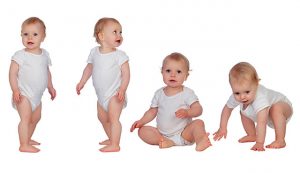Ways to promote your child’s development
 There are lots of ways to promote physical development in babies and young children.
There are lots of ways to promote physical development in babies and young children.
These are some links to some useful leaflets, which will give you some helpful hints and tips on ways that you can help to promote your child’s development and help them to reach their motor milestones.
Below are some leaflets for a range of ages on developing skills through play.
Useful websites and advice leaflets
- Born to move
- Ideas for times when your baby is awake
- Babywalkers
- Promoting physical development
- Toy and play information leaflets (ranges from 0-3 to 24-36 months)
Strategies and advice
There are many ways to support a child's motor development. Watch our short film clips for ideas and advice.
Concerns about flat feet/in-toeing
Gait (walking) anomalies are common in young children and are usually not of concern. These two leaflets give some advice about flat feet and in-toeing. Children who present with these, usually do not need to see a physiotherapist, unless there are also concerns about the child’s motor development.
Concerns about torticollis/plagiocephaly
If you have been told that your child has torticollis and/or plagiocephaly (when one side of their head is flattened), you may have been referred to a physiotherapist for advice.
If your child was born prematurely
If your baby was born prematurely you may also find the information on the Bliss website useful. These are some links that you may find particularly relevant.
Referral and advice for health professionals
Advice for health professionals
- Tips for health visitors considering a physiotherapy referral for a young child born prematurely
- If the baby was born under 28 weeks gestation, less than 1000g in weight or was cooled just after birth, please check whether they are known to a physiotherapist. They should have had a referral made prior to discharge from the neonatal unit.
- Don’t forget to correct the child’s age for prematurity and consider their development in line with this, rather than their birth age.
- Is the child prescribed home oxygen? Developmental delay is common in this group of children. Please monitor their progress for 2-3 months, before referring for assessment, unless you have significant concerns.
- If you have concerns about gross motor delay, check other areas of development too. If you have concerns about multiple areas, send the referral via the Children’s Care Coordination Team (CCCT, previously known as Early Support). Please note that the CCCT referral does not include referral to Portage. If a referral to Portage is required, please make the referral via the Kelsi website.
- When considering the results of the Ages and Stages Questionnaire, bear in mind whether the child is using both hands. Note that it is not normal for a child to develop a hand preference before 18 months of age. Hand dominance prior to this may indicate a cause for concern.
- Follow up parental concerns about development with an observation session, prior to referral. Any additional information that can be given will help with the triage process and will ensure that the child is seen by all the members of the integrated team that are required to support them.
- Please make an urgent referral, if you notice that a child’s motor skills have regressed.
- If in doubt, please do phone a physiotherapist at one of our bases.